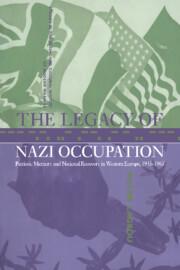Book contents
- Frontmatter
- Contents
- List of illustrations
- Acknowledgements
- List of abbreviations
- Introduction
- Part I Troublesome heroes: the post-war treatment of resistance veterans
- 1 Appropriating victory and re-establishing the state
- 2 Heroes of a nation: Belgium and France
- 3 A nation of heroes: the Netherlands
- Part II Repatriating displaced populations from Germany
- Part III The legacy of forced economic migration
- Part IV Martyrs and other victims of Nazi persecution
- Conclusion
- Bibliography
- Index
2 - Heroes of a nation: Belgium and France
Published online by Cambridge University Press: 02 December 2009
- Frontmatter
- Contents
- List of illustrations
- Acknowledgements
- List of abbreviations
- Introduction
- Part I Troublesome heroes: the post-war treatment of resistance veterans
- 1 Appropriating victory and re-establishing the state
- 2 Heroes of a nation: Belgium and France
- 3 A nation of heroes: the Netherlands
- Part II Repatriating displaced populations from Germany
- Part III The legacy of forced economic migration
- Part IV Martyrs and other victims of Nazi persecution
- Conclusion
- Bibliography
- Index
Summary
Nowhere was patriotic legitimacy more crucial to post-war politics than in France: it was General Charles De Gaulle's only legitimacy when he returned from exile and declared the constitutionally legitimate heir of the Third Republic, the Vichy regime, null and void. The amalgamation of colonists and exiles that had made up his Free French Forces was not a firm basis on which to build a new regime. De Gaulle was thus forced to promote a generous and collective vision of the French struggle for liberation, to pass over in silence the role of Vichy and of the Allies, and to nationalise the contribution of the resistance movements on the French territory. As provisional head of state between the liberation and January 1946, from the (extra-parliamentary) opposition until 1958 and as president of his self-styled Fifth Republic until 1969, De Gaulle applied a commemorative policy which assimilated the Nation and the Resistance in a symbolism that was simultaneously heroic, emblematic, abstract and elitist. The national honour had been safeguarded throughout the ordeal of the war by the heroes who presided over its destiny, in exile or on French soil, as combatants or as martyrs. Gaullist speeches and rituals staged tributes to the army and the nation through exemplary figures of patriotism and amalgamated the ambiguous victory of the Second World War with the patriotic triumph of the first. Abstract commemoration and its consensual appeal suited the general better than the cult of veteranism as a social movement.
- Type
- Chapter
- Information
- The Legacy of Nazi OccupationPatriotic Memory and National Recovery in Western Europe, 1945–1965, pp. 38 - 58Publisher: Cambridge University PressPrint publication year: 1999



